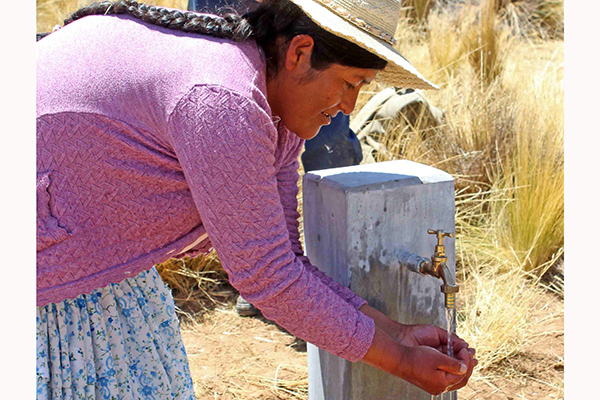
By María Antonia Pérez, Rotary Positive Peace Activator and Rotary Peace Fellow
I am excited about a project I have been part of in Bolivia that underscores water’s critical role in fostering stability and prosperity. As we observe World Water Day on 22 March, which has a theme of “Water for Peace,” I feel this project demonstrates Rotary’s unwavering dedication to tackling global challenges and the transformative potential of positive peace in driving sustainable change.
Currently, 2.2 billion people worldwide lack access to safe water, and over 3 billion depend on water crossing national borders, presenting cooperation challenges that endanger water quality and quantity, thus posing threats to social and international stability, according to the United Nations.
Water, sanitation, and hygiene (WASH) aren’t just essential for health, they are also crucial to peacebuilding objectives.
Water for Indigenous communities in Bolivia
Several Rotary Clubs from New Mexico, including Hobbs, Lovington, Carlsbad, Eunice, Silver City, Albuquerque, West El Paso, Taos and Tucumcari along with the La Paz San Jorge Rotary Club from Bolivia, are collaborating with the United4Change Center (U4C) and Quaker Bolivia Link (QBL) to undertake an innovative water project in 2024. This project aims to provide clean, safe water access to two rural indigenous communities in Bolivia. These clubs have completed similar WASH projects in two other indigenous rural communities in Bolivia, as part of the “Ampara Project.”
Accessing clean water in rural Bolivia is a significant challenge due to the absence and contamination of clean water. These longstanding issues are becoming unsustainable, compounded by a growing and profound lack of fresh water. The effects of climate change have exacerbated the situation, threatening the health and well-being of residents, especially children who experience high incidences of diarrhea and other water-borne diseases, particularly those under 5 years of age. Due to strong freezing winds, reduced rainfall, and the absence of natural water sources, families, especially children, frequently engage in unsanitary practices. Water sources are located in remote and dispersed places, and the majority of families in the participating communities lack proper latrines, resorting to rudimentary cesspools for waste disposal.
Building together
The project aims to empower marginalized groups and create conditions for sustainable human existence. We work with cooperating organizations, local and international Rotarians, local governments, and villagers. The organizations are hand-selected by experienced Rotarians and provide training, capacity-building, tools, and water systems. In 2021, the project benefitted 72 families, reducing the rate of diarrhea and aiding in COVID-19 prevention through increased handwashing.
In 2024, a new project “SoyAgua” is underway to create access to safe drinkable water for approximately 150 indigenous villagers. This project will result in a faucet being installed in each of the 30 homes, which has never been done before. The project will also involve installing family water sinks for water extraction and handling, water tanks for distribution, and purification filters in the pipe downspouts for water collection to enhance quality and create individual subsystems for each family. Additionally, the project will train 500 villagers including community leaders. Committees of villagers will ensure continuous operation and sustainability by managing administrative and operational functions.
Rotary Peace Fellows and Positive Peace participation
The Rotary Clubs of Hobbs (New Mexico) and San Jorge (Bolivia) have a long-standing tradition of involving Peace Fellows and Peace Activators in their global grants. This project has included participation by Ximena Murillo, a Rotary Peace Fellow and CEOP of U4C, Carla Murillo, a Rotarian and Positive Peace Activator from Bolivia, Magdalena Zurita, a Rotary Peace Fellow from Argentina, and Maria Antonia Perez, a Rotary Peace Fellow and Positive Peace Activator from Colombia.
This project addresses the Pillars of Positive Peace promoted by the partnership between Rotary and the Institute for Economics and Peace (IEP) by addressing human rights, equality, and good governance. By ensuring access to clean water and sanitation, the project fosters trust between communities and governments, prevents conflicts over water resources, and promotes economic development and social cohesion within marginalized communities.
In regions where water resources are scarce, providing sustainable access to water and sanitation not only prevents the potential for conflict but also fosters good relations between neighboring communities who may share water sources.
Clean water isn’t just a basic necessity; it’s a cornerstone for peace, prosperity, and sustainable development. Through collaborative efforts and unwavering dedication, Rotary and its partners are striving to ensure that everyone, regardless of their background or circumstances, has access to this fundamental human right.
Read a blog post on Rotary Service in Action about the Rotary-UNEP Community Action for Fresh Water initiative.
https://blog.rotary.org/2024/03/22/flowing-toward-peace-the-power-of-clean-water/
